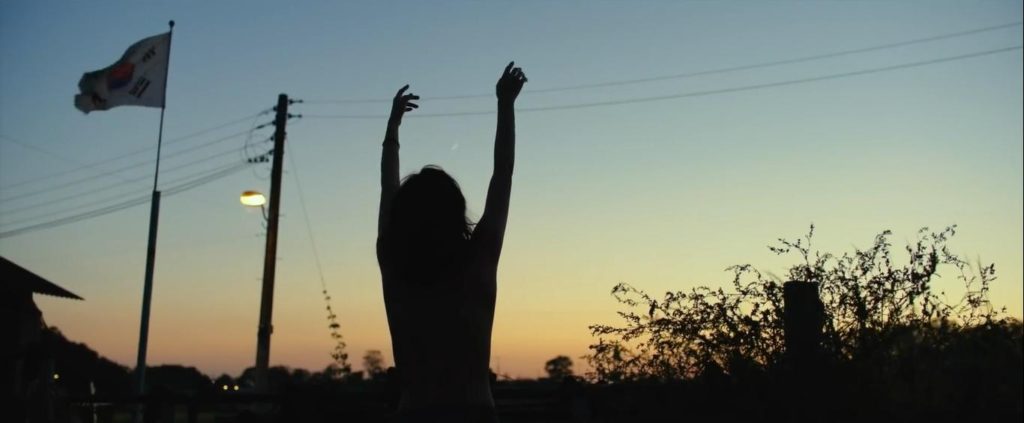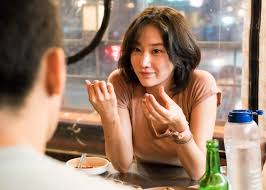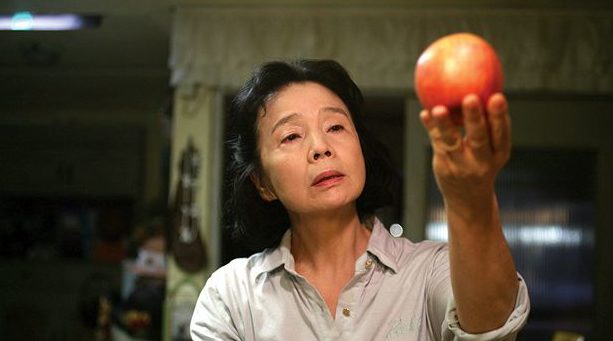
Burning is a hypnotically compelling 2 hour, 28 minute slow burn that begins as a character study, evolves into a romance and then a mystery, and finally packs a powerhouse punch with a thriller climax. It’s a superb achievement for director and co-writer Chang-dong Lee.
Jong-su (Ah-in Lee) is a young man living an isolated, unfulfilling life when, on a shopping excursion, he encounters a childhood schoolmate, Hae-mi (Jong-seo Jun). She is as blithe and fun-loving as he is introverted and socially awkward. Sex turns Jong-su’s fascination with Hae-mi into a worshipful adoration.
She heads off to a long-planned African vacation, and returns with a new acquaintance, Ben (Steven Yeun); to Jong-su’s profound chagrin, Hae-mi and Ben, a rich playboy, have clearly become intimate.
Ben invites Jong-su to join along with Hae-mi and his other friends in a cavalcade of partying. Jong-su senses – as does the audience – that Ben is not a good guy. Jong-su, an aspiring writer, calls Ben a “Great Gatsby”. But Gatsby, while rich and impossibly cool, was also vulnerable – hiding his past and aching for Daisy. Ben doesn’t seem to care about anything enough to be vulnerable, and there’s just something “off” about him.
Jong-su also smolders with the feeling that Ben is not good enough for Hae-mi (up there on Jong-su’s imagined pedestal). Jong-su lapses into the jealousy and obsession that a young man feels for a woman, who more beautiful that he ever could hope to woo, has granted him the grace of sexual intimacy.
Jong-su now finds Ben fascinating, too, and, when Ben casually discloses a disturbing hobby, Jong-su embarks on an investigation that leads to more mysteries and even more disturbing revelations.
One particular scene in Burning is perfect. After the three characters smoke some pot, Hae-mi takes off her shirt and dances, alone and topless, before the men, silhouetted against a purple, blue and orange twilight sky. As Hae-mi sways in her mesmerizing dance, we glimpse a character’s brief – and disturbingly revealing – yawn! As Burning goes on, Chang-dong Lee perfectly builds the story; we become more and more uneasy until we gasp at the ending.

Jong-su is trying to write his first novel. If he were going to “write what you know”, then it would be a very boring book. But by the end of Burning, he has the material for a seething, blockbuster page-turner.
This should be a star-making turn for Jong-seo Jun. Amazingly, this is her ONLY screen credit. Her tangerine-peeling pantomime is amazing. Her dance, though, is one of the most unforgettable moments in 2018 cinema. Steven Yuen and Ah-in Lee are excellent, too.

What is “burning” in Burning? There is literal burning (as in arson), but the deepest burning is that of obsession. Jong-su isn’t fully alive until he is ignited by that obsession.
This film was critically praised after it won a prize at the 2018 Cannes Film Festival. I had missed Burning, which I had thought of as “the Korean ménage à trois movie“, in theaters last year, but I’ve now added it to my Best Movies of 2018. You can stream Burning now from Netflix, Amazon, iTunes and Vudu.

